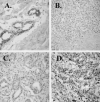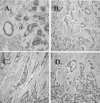Relationship of coregulator and oestrogen receptor isoform expression to de novo tamoxifen resistance in human breast cancer
- PMID: 12454770
- PMCID: PMC2376286
- DOI: 10.1038/sj.bjc.6600654
Relationship of coregulator and oestrogen receptor isoform expression to de novo tamoxifen resistance in human breast cancer
Abstract
This study addresses the hypothesis that altered expression of oestrogen receptor-beta and/or altered relative expression of coactivators and corepressors of oestrogen receptors are associated with and may be mechanisms of de novo tamoxifen resistance in oestrogen receptor positive breast cancer. All cases were oestrogen receptor +, node negative, primary breast tumours from patients who later had no disease progression (tamoxifen sensitive) or whose disease progressed while on tamoxifen (tamoxifen resistant). Using an antibody to oestrogen receptor-beta that detects multiple forms of this protein (total) but not an antibody that detects only full-length oestrogen receptor-beta 1, it was found that high total oestrogen receptor beta protein expressors were more frequently observed in tamoxifen sensitive tumours than resistant tumours (Fisher's exact test, P=0.046). However, no significant differences in the relative expression of oestrogen receptor beta2, oestrogen receptor beta5 and full-length oestrogen receptor beta1 RNA in the tamoxifen sensitive and resistant groups were found. Also, when the relative expression of two known coactivators, steroid receptor RNA activator and amplified in breast cancer 1 RNA to the known corepressor, repressor of oestrogen receptor activity RNA, was examined, no significant differences between the tamoxifen sensitive and resistant groups were found. Altogether, there is little evidence for altered coregulators expression in breast tumours that are de novo tamoxifen resistant. However, our data provide preliminary evidence that the expression of oestrogen receptor beta protein isoforms may differ in primary tumours of breast cancer patients who prove to have differential sensitivity to tamoxifen therapy.
Copyright 2002 Cancer Research UK
Figures


Similar articles
-
Expression analysis of estrogen receptor alpha coregulators in breast carcinoma: evidence that NCOR1 expression is predictive of the response to tamoxifen.Clin Cancer Res. 2003 Apr;9(4):1259-66. Clin Cancer Res. 2003. PMID: 12684393
-
BCAR4 induces antioestrogen resistance but sensitises breast cancer to lapatinib.Br J Cancer. 2012 Sep 4;107(6):947-55. doi: 10.1038/bjc.2012.351. Epub 2012 Aug 14. Br J Cancer. 2012. PMID: 22892392 Free PMC article.
-
Tamoxifen-induced ER-alpha-SRC-3 interaction in HER2 positive human breast cancer; a possible mechanism for ER isoform specific recurrence.Endocr Relat Cancer. 2006 Dec;13(4):1135-45. doi: 10.1677/erc.1.01222. Endocr Relat Cancer. 2006. PMID: 17158759
-
Thoughts on tamoxifen resistant breast cancer. Are coregulators the answer or just a red herring?J Steroid Biochem Mol Biol. 2000 Nov 30;74(5):255-9. doi: 10.1016/s0960-0760(00)00101-1. J Steroid Biochem Mol Biol. 2000. PMID: 11162933 Review.
-
Epidermal growth factor receptor/HER2/insulin-like growth factor receptor signalling and oestrogen receptor activity in clinical breast cancer.Endocr Relat Cancer. 2005 Jul;12 Suppl 1:S99-S111. doi: 10.1677/erc.1.01005. Endocr Relat Cancer. 2005. PMID: 16113104 Review.
Cited by
-
Prognostic Significance of High Expression of ER-beta in Surgically Treated ER-Positive Breast Cancer Following Endocrine Therapy.J Breast Cancer. 2012 Mar;15(1):79-86. doi: 10.4048/jbc.2012.15.1.79. Epub 2012 Mar 28. J Breast Cancer. 2012. PMID: 22493632 Free PMC article.
-
Impact of Nuclear Oestrogen Receptor Beta Expression in Breast Cancer Patients Undergoing Neoadjuvant Chemotherapy.Geburtshilfe Frauenheilkd. 2019 Oct;79(10):1110-1117. doi: 10.1055/a-0987-9898. Epub 2019 Oct 22. Geburtshilfe Frauenheilkd. 2019. PMID: 31656321 Free PMC article.
-
Expression of oestrogen receptor-beta in oestrogen receptor-alpha negative human breast tumours.Br J Cancer. 2006 Sep 4;95(5):616-26. doi: 10.1038/sj.bjc.6603295. Epub 2006 Aug 1. Br J Cancer. 2006. PMID: 16880783 Free PMC article.
-
Estrogen Receptor β Expression and Its Clinical Implication in Breast Cancers: Favorable or Unfavorable?J Breast Cancer. 2022 Apr;25(2):75-93. doi: 10.4048/jbc.2022.25.e9. Epub 2022 Feb 21. J Breast Cancer. 2022. PMID: 35380018 Free PMC article. Review.
-
Epigenetics meets metabolism through PHB-mediated histone H3.3 deposition by HIRA.Stem Cell Investig. 2017 May 26;4:46. doi: 10.21037/sci.2017.05.08. eCollection 2017. Stem Cell Investig. 2017. PMID: 28607920 Free PMC article. No abstract available.
References
-
- AnzickSKononenJWalkerRAzorsaDTannerMGuanXSauterGKallioniemiOTrentJMeltzerP1997AIB1, a steroid receptor coactivator amplified in breast and ovarian cancer Science 277965968 - PubMed
-
- DotzlawHLeygueEWatsonPMurphyL1997Expression of estrogen receptor-beta in human breast tumors J Clin Endocrinol Metabol 8223712374 - PubMed
-
- FuquaSSchiffRParraIFriedrichsWSuJMcKeeDSlentz-KeslerKMooreLWillsonTMooreJ1999Expression of wild-type estrogen receptor beta and variant isoforms in human breast cancer Cancer Res 5954255428 - PubMed
-
- GreenSWalterPKumarVKrustABornertJArgosPChambonP1986Human estrogen receptor cDNA: sequence, expression, and homology to v-erb-A Nature 320134139 - PubMed
Publication types
MeSH terms
Substances
Grants and funding
LinkOut - more resources
Full Text Sources
Other Literature Sources
Medical

